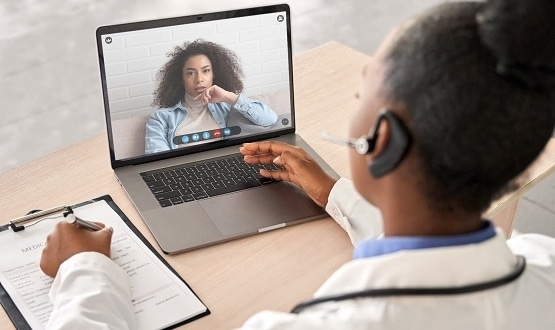NHS England launches £45m funding for GP online consultation system

The future of primary care has to be ‘way more technology enabled’ as a £45 million fund to help GP surgeries implement online consultation programmes is launched this week.
Speaking on the second day of EhiLive on 1 November, head of general practice development at NHS England, Dr Robert Varnam explained how GP practices across England are coming under increasing pressures.
This pressures, Dr Varnam said, are down to a number of factors including population growth and a rise in the complexity of care GPs are required to deal with.
Varnam added: “One issue is we don’t have as many GPs as we need and we don’t have as many GPs as we are used to having.”
“These big pressures helps us conclude that change is necessary.”
He also said that the future of primary care must be ‘way more technology enabled’ adding that “change is everywhere”.
Varnham then announced that £45m of funding from NHS England was launched on October 30.
The money will be used to implement an online consultation programme for three years across a number of GP practices.
Online consultations involve a website or app being the first point of contact with the aim of promoting self care and patient empowerment.
While funding is available to all Varnham made it clear that online consultation programmes are not being ‘forced’ onto GP practices.
Calling online consultations ‘exciting’, Varnham added: “The future of primary care cannot look like it is now and patient facing technology is a key part of helping the pressure in primary care.”
He also said that ‘groups of GP practices’ could implement the technology together and help one another.
In September, a mobile app that allows patients to access all their medical information went live with three major GP suppliers.
The app links a personal health record (PHR) with patient-facing services (PFS).
The impact of the Wannacry ransom attack outbreak dominated the first day of EHI Live.
Charles Gutteridge, chief clinical information officer (CCIO) of Barts Health NHS Trust and Matthew Connor, head of IT at Southport and Ormskirk NHS Trust, shared their experiences of the attack which caused widespread disruption to England’s health services in May.





6 Comments
Go John legendary
Paul,
Anyone who thinks that disintermediation is a practical solution to the current primary care problems simply doesn’t understand what primary care does! (And let me make it clear that I am not accusing you of this, because you are simply reporting what you think may be the motivation.)
But let’s be clear, for all those not in primary care who are reading this, on the facts about what primary care does:
1. We are NOT a ‘referring centre’ (though there are times when we need to make referrals – perhaps once or twice a day)
2. We are NOT there to treat self-limiting illnesses – though being sure that a self-limiting illness is what the patient has actually got is something that is often apparent only after it’s been properly diagnosed and/or settled down…
3. … so we ARE there to try to distinguish the harmless from the potentially nasty.
4. We ARE also there to spot the potentially dangerous illness masquerading as something different (and even an illness in a completely unexpected specialty) — post-flu weakness which is actually myasthenia gravis; loss of weight which is diabetes; ‘stress’ which is actually ME…
5. And vastly important (actually, joint first) controlling the complex patient with several different long-term conditions, which is a complex balance of many (often competing) underlying problems.
…and with all this, we are the gatekeepers to the NHS – in other words ensuring that expensive hospital facilities aren’t wasted on inappropriate things – that don’t need to be seen; or don’t need to be seen in secondary care, or alternatively, which actually need to be seen very urgently indeed because there’s something really unpleasant going on.
Those who imagine that all this is simple, and that GPs are little more than people redirecting patients to the appropriate specialist department really don’t have a grasp of what the good GP actually does — yet the DH seems to be behaving as though this is our function, that most of us are clueless imbeciles, better described as ‘failed hospital doctors’.
I’ve said for ages that being a GP is the hardest job in medicine to well… and the easiest to do badly, and I stand by that. But in addition, I’d like to make a prediction: if the GP role is nullified by those who think we are simply guides to show where to get proper medicine, then WHEN primary care fails the nation will discover just how much highly complex medicine the GP actually did — but by then it will be too late, because my colleagues will have had enough: many will have left the UK, never to return. Meanwhile, secondary care will be faced by a tsunami of unfiltered patients, and will also be overwhelmed — very much more expensively than they would have been if they had been treated in properly-resourced primary care.
I really can’t see how ‘disintermediation’ could ever work to replace the GP: can you?
As John says.
Is online consultation any quicker for the GP than face to face? It must certainly carry more risk, as at best you will get the history and images of uncertain quality – no option to examine properly. What will the MDOs’ views on this be?
If it’s no quicker, then nothing is saved, and no more patients will be seen.
Hi John, I think one idea is to avoid GP consultations altogether. For example, ‘disintermediation’.
https://beyondclinical.wordpress.com/2008/04/07/disintermediarisation/
Paul, so you want the consultation to be with a specialised consultant, who just happens to have slack time available for unfiltered referrals?
How many patients would get the right specialty at the first attempt?
I also heard on the radio today that this scheme will only be available for otherwise well patients [ie the ones whose capitation fees support the provision of services to those with long term problems]. This will mean the business model for GP funding will be wrecked.
Some might think this is one more step towards collapse of the NHS, with the long-term aim of enforced privatisation.
William
I don’t care what plans NHS Digital has for primary care as long at it realises that a GP can only be in one place at once, dealing with one patient at a time. If there are to be more on-line consultations, then something else has to be dropped – such as the equivalent amount of time doing face to face consultations. Not rocket science, but a trap that many, many people fall into.
Comments are closed.